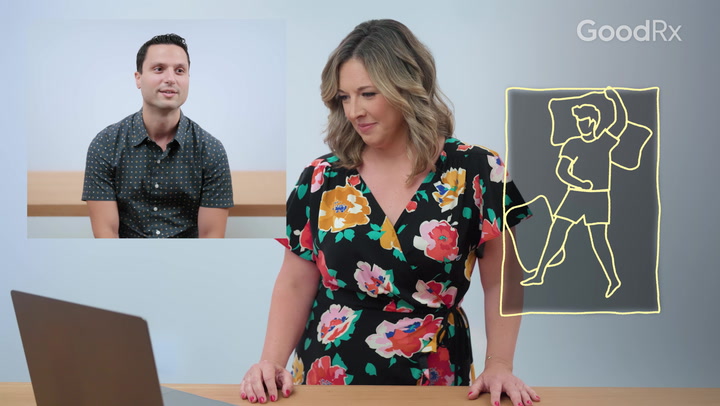
6 Natural Ways to Boost Melatonin
Key takeaways:
Melatonin is a hormone that regulates your sleep-wake cycle, also known as your circadian rhythm.
The amount of melatonin your body makes is influenced by light exposure. But other lifestyle factors can also play a role in how much of it your body makes.
Some natural ways to boost melatonin include getting sunlight in the morning, avoiding screens before bed, and eating melatonin-rich foods.

Melatonin is a hormone that plays a major role in your sleep-wake cycle, or what’s scientifically referred to as your circadian rhythm. While there’s always some level of melatonin in your body, the amount changes throughout the day.
Typically, your melatonin levels go up when the sun goes down, signaling to your body that it’s time to go to bed. Your levels peak between 2AM and 4AM and start to decrease again throughout the early morning hours. Melatonin levels are lowest when you wake up.
Most of the time, your body is able to naturally regulate its production of melatonin. But many factors can affect your melatonin levels and interfere with a good night’s rest. The good news is, there may be natural ways to boost melatonin.
Search and compare options
Natural ways to increase melatonin
While taking a melatonin supplement is an option, making simple changes to your routine may help you naturally increase your melatonin levels.
It’s also worth noting that some strategies — like timing your sun exposure and being mindful of screen time — may have a more noticeable effect on your sleep than others. This is because light influences how much melatonin your body is able to make. Let’s take a closer look below.
1. Get sunlight in the morning
Getting exposure to sunlight early in the morning can make you more alert during the day, and trigger your body to produce nighttime melatonin sooner, so you feel sleepy earlier at night.
Sunlight also has additional benefits that might indirectly contribute to better sleep. These include:
Producing serotonin: Serotonin is a chemical in your brain that is most commonly known to regulate your mood — but it is also connected to other processes including sleep.
Making vitamin D: This nutrient has many important roles in the body, like supporting bones and muscles, blood vessel health, and healthy brain function.
Fighting seasonal affective disorder: Lack of sunlight can also lead to seasonal affective disorder, or a condition where some people may experience low mood or depression symptoms during certain times of year — especially winter. Sunlight or light therapy can help by balancing your sleep-wake cycle.
Start your day with 5 to 10 minutes outside if you can. If you can’t, open your curtains as soon as you wake up to let some sunlight in.
Read more like this
Explore these related articles, suggested for readers like you.
2. Sleep in a dark room
As important as sunlight is, too much light at night — including dim light — can stop your body from releasing melatonin and make it harder to fall asleep. Light exposure at night can also shorten how long your melatonin levels remain high. This can affect how long you stay asleep.
To help combat this, try keeping your room as dark as possible. This may mean:
Getting blackout curtains
Unplugging electronic devices
Keeping your phone and TV out of your room, if possible
3. Reduce screen time at night
Research has linked screen time to lower levels of melatonin and poor sleep quality — this includes total screen time use as well as when you use digital devices. In one small study, people who were told to stop using their phones 30 minutes before bed fell asleep faster, stayed asleep longer, and slept better compared to those who weren’t given instruction.
While there is no hard rule on when to ditch the screens for the night, the American Academy of Ophthalmology recommends avoiding screens 1 to 2 hours before bedtime. This applies to:
Watching TV in bed
Scrolling through your phone
Browsing on your laptop
If you can’t avoid screens completely, try to use night mode whenever possible. The warm light doesn’t appear to suppress melatonin as much as blue light.
4. Watch your caffeine intake
There’s not a ton of research on caffeine’s effect on melatonin. But some lab studies suggest that caffeine might lower melatonin levels by blocking adenosine, which is involved in melatonin’s production. Like melatonin, adenosine is a chemical that makes you feel sleepy. When levels go up, you get sleepy. When adenosine receptors are blocked, you stay more alert.
While up to 400 mg of caffeine each day (around four to five cups of coffee) is considered safe for most adults, remember that everyone reacts to caffeine differently. So if you’re not sleeping well, reduce your intake by one or two cups and see how you feel. You can also try having your caffeine earlier in the day to see if that makes a difference in your nightly rest.
5. Try exercising in the morning
Exercising at different times of day can have different benefits. But a small study suggests that exercising in the afternoon may prompt your body to release less melatonin in the evening. This same study showed that people who exercised in the morning didn’t have a shift in their melatonin levels.
But other findings have been somewhat mixed. One study found that your chronotype — or sleep timing patterns — might affect whether an early or later workout benefits your sleep. People who consider themselves to be “night owls” may not have disrupted sleep with an evening workout, whereas those who rise early might benefit from an early workout.
Still, if you have trouble sleeping, it may be worth adjusting your exercise schedule to see if it makes a difference in your ability to fall and stay asleep at night.
6. Eat foods high in melatonin
A handful of foods contain natural melatonin. And according to some research, eating these foods may increase the amount of the hormone in your body. These foods include:
Eggs
Fish
Milk
Nuts
Sprouted nuts and seeds
Certain grains, like oats and barley
Mushrooms
Dark green vegetables
Cherries and tart cherry juice
Grapes
Bananas
Pineapple
It’s worth noting that other nutrients in these foods — namely serotonin and tryptophan — could also play a role in making melatonin.
How do you know if you need natural melatonin?
One of the most common signs you can benefit from natural melatonin is disrupted sleep. This may mean you have trouble falling or staying asleep or feel restless throughout the night.
You may also benefit from a natural melatonin boost if:
You are an older adult, since melatonin production naturally decreases as you age.
You have neurodegenerative conditions — like Parkinson’s or Alzheimer’s disease — that are associated with low melatonin levels.
You have certain chronic health conditions, including heart disease, cancer, or Type 2 diabetes, which can cause low melatonin production.
Do you need a melatonin supplement?
If you have tried natural ways to increase melatonin levels and haven’t had any luck, you can talk with a healthcare provider about taking a melatonin supplement. This is especially the case if:
You are experiencing jet lag.
You have insomnia.
You have anxiety ahead of a surgery.
Your work schedule involves shift work.
Since melatonin can interact with medications, be sure to also provide a full list of medications and supplements you’re taking to a healthcare provider or pharmacist. They can also help you rule out any underlying problems that might be affecting your sleep and recommend the best treatment option for you.
The bottom line
Light exposure has a significant effect on your body’s melatonin production and circadian rhythm. That’s why getting some early morning sunshine and limiting screens an hour or two before bed is your best bet at naturally increasing melatonin. Other tips include keeping your room dark, trying a morning workout, and eating foods like eggs, mushrooms, and cherries — while limiting your coffee, too.
If the natural route to increase melatonin isn’t working, it may be time to see a healthcare provider. They may recommend a melatonin supplement and can check to see whether an underlying issue is affecting your sleep.
Why trust our experts?



References
Anghel, L., et al. (2022). Benefits and adverse events of melatonin use in the elderly (review). Experimental and Therapeutic Medicine.
Cardinali, D. P. (2021). Melatonin and healthy aging. Vitamins and Hormones.
Carlson, L. A., et al. (2019). Influence of exercise time of day on salivary melatonin responses.
Gooley, J. J., et al. (2010). Exposure to room light before bedtime suppresses melatonin onset and shortens melatonin duration in humans. The Journal of Clinical Endocrinology and Metabolism.
Hartley, S., et al. (2022). Do both timing and duration of screen use affect sleep patterns in adolescents? Public Library of Science One.
He, J., et al. (2020). Effect of restricting bedtime mobile phone use on sleep, arousal, mood, and working memory: A randomized pilot trial. Public Library of Science One.
Mead, M. N. (2008). Benefits of sunlight: A bright spot for human health. Environmental Health Perspectives.
Meng, X., et al. (2017). Dietary sources and bioactivities of melatonin. Nutrients.
Park, J., et al. (2018). Lifetime coffee consumption, pineal gland volume, and sleep quality in late life. Sleep.
Pereira, G. A., et al. (2022). Relationship between food consumption and improvements in circulating melatonin in humans: An integrative review. Critical Reviews in Food Science and Nutrition.
Porter, D., et al. (2022). Digital devices and your eyes. American Academy of Ophthalmology, EyeSmart.
Teran, E., et al. (2020). Evaluation of two strategies for alleviating the impact on the circadian cycle of smartphone screens. Optometry and Vision Science: Official Publication of the American Academy of Optometry.
Thomas, J. M., et al. (2020). Circadian rhythm phase shifts caused by timed exercise vary with chronotype. Journal of Clinical Investigation Insight.
Tordjman, S., et al. (2017). Melatonin: Pharmacology, functions and therapeutic benefits. Current Neuropharmacology.





























